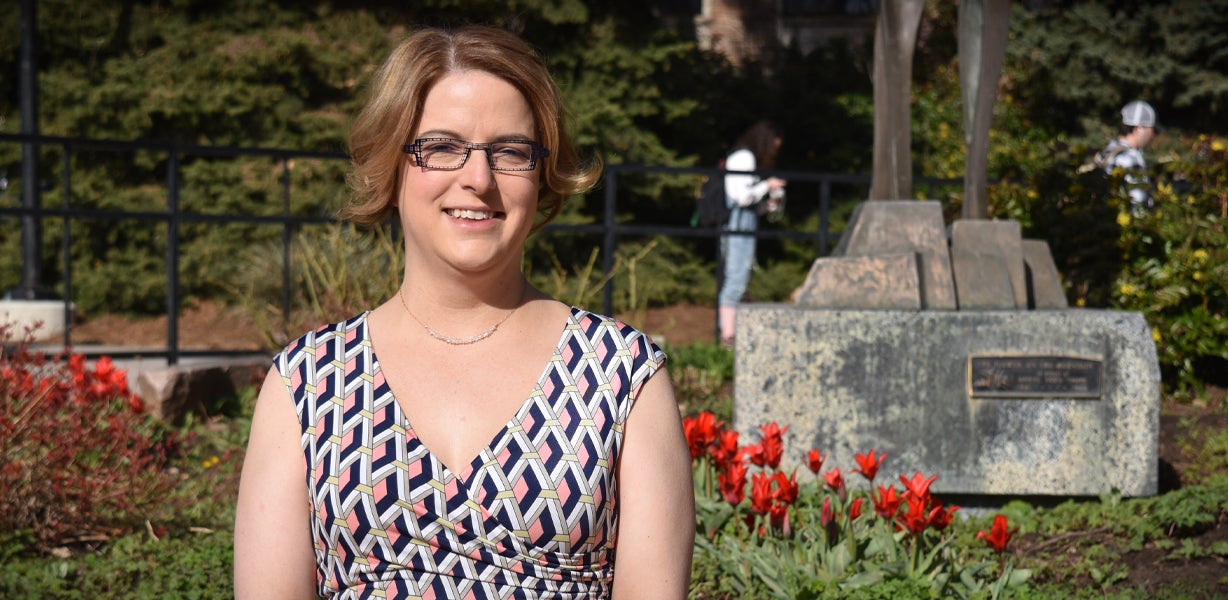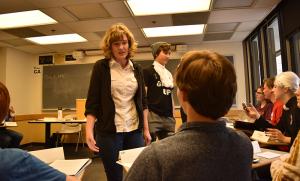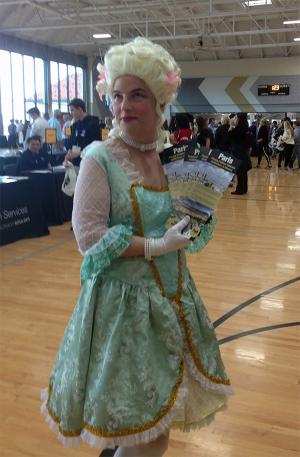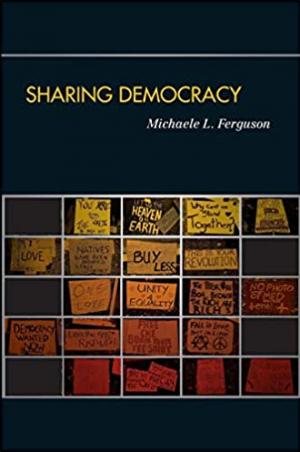Five questions for Michaele Ferguson
One of two faculty members across the University of Colorado system awarded the title of CU President’s Teaching Scholar in 2020, Michaele Ferguson is an associate professor of political theory in CU Boulder’s Department of Political Science. There, her research specialty is feminist political theory.
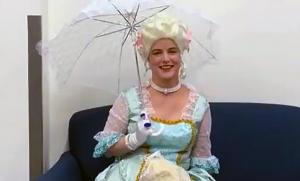
“It’s what I care about most,” she says of the topic. “I had an alternate career path that involved focusing on medieval history and literature – I even studied Middle French in college and translated some important feminist texts into English. But when it came down to it, I knew that politics is what drives me. There’s always something new happening in politics; it’s never the same. For some people, that’s stressful; for me, that’s an endless source of research projects.”
She shares that passion for politics with her students, emphasizing their ability to change our world.
“What I am teaching my students to do is to understand that they can create political change, they can see themselves as leaders, public speakers, political strategists who can shape the course of history,” Ferguson says. “What fascinates me about the history of feminist activism is how it highlights over and over again the important role of people getting involved politically to change their world. The changes that we have seen over the last two centuries with respect to gender roles are dramatic.
“Studying feminist politics and feminist theory is a way for me to study the role that ordinary people play in creating change. That is the most powerful message there is in the study of politics.”
1. Many of the courses you teach utilize role playing. How did this come about, and how does it play out in a typical class?
Completely by accident, I ended up as a discussant at a conference for a set of papers on using simulations and other high-impact practices in Political Science courses. The papers came from lots of different subfields of Political Science – Comparative Politics, American Politics, Public Policy, and International Relations. But there were no papers from my own area: Political Theory. I was really excited about the activities they described, but they seemed pretty far from what I normally do. It made sense to have a simulation of the U.S. Congress determining the budget, but I couldn’t see how I could possibly teach Plato’s Republic or John Locke’s Second Treatise of Government through a simulation!
Right after that panel, I had lunch with a friend, Alisa Rosenthal, who is a professor at Gustavus Adolphus College in Minnesota, and I told her about the papers. I complained that there was no way to do this in political theory, and she stopped me and said, “Actually there is. It’s called Reacting to the Past.” It turned out that she was hosting a conference the following spring, when I was on sabbatical, where I could play a game and see what it was all about. I enthusiastically signed up. And when I came back to the classroom that fall – this would have been 2014 – I taught my first game. I’ve since taught a dozen different games in many different classes.
The idea with Reacting to the Past is that you role play people in a specific historic moment – whether in the recent past or the far distant past. The roles are based on either actual historical figures or composites of people who might have lived in that time period. So in the game set at the Constitutional Convention, students get to be Benjamin Franklin or Alexander Hamilton. In the game where students get to consider putting Socrates on trial, someone gets to be Plato, Crito or Xenophon. In the game about the art world in Paris in 1889, someone is Degas, another Monet, another Berthe Morisot.
In the game, everything that really happened in history before the start of the game “really happened.” So the French Revolution game starts in summer 1791 – the revolution is already two years old at that point. But from the moment the game begins, the students can take the game in whatever direction their characters choose. Maybe the King isn’t sentenced to death at the guillotine. (My last King actually managed to defeat the revolutionaries and restore absolute monarchy!). Maybe the partition of Pakistan doesn’t happen in 1947. Maybe Mayor Daley doesn’t order the police to crack down on protesters during the 1968 Convention. Maybe Nixon refuses to resign, and gets impeached and removed from office. Anything is possible when students are reacting to the past, because the direction they go in is one of their own making. And that’s not just about the past – that’s a lesson for the future.
So what does the class look like? Well, first of all if you came into my classroom when we are playing a game, it wouldn't look like class was going at all. I would be sitting in the back of the room, in a corner, and it would look like my students had staged a revolt, and had taken over. The chairs and tables would be rearranged, there might be some students with props or costume elements. They would be debating some issue, maybe giving speeches or heckling, or passing notes and huddling in small groups to strategize. Sometimes there might be protests or trials or theatrical performances mid-game.
You would hear some amazing, moving speeches, and see some incredibly creative conniving and deal-making. There’s yelling, there’s laughter, there are groups spilling out in the hallway to have private conversations. (I usually have to request a classroom far away from any other classes so we don’t disrupt them!) Most importantly from an educator’s perspective, what you would see is students deeply invested in learning.
2. You’ve been known to dress as Marie Antoinette for a French Revolution class. Are there other roles you’ve played as well?
Well, the rumors are a bit exaggerated. What really happened is that one year, my first-year seminar was in the midst of a game about the French Revolution, and we happened to have a class on Halloween. I’ve never been the kind of professor who comes to campus in a costume for Halloween, but that year, I thought it would be really funny if I came into class as Marie Antoinette. So I ordered a few things from Amazon (at the very last minute, too!), and the final package arrived about 20 minutes before class started. My students had no idea this was going to happen. But I can tell you this: That was the first time any student wanted to take a selfie with me!
My department then made a video of me in that costume because they loved it so much. And another student in a different class asked me if I was going to dress up at all. I told him that if he wanted to see Marie Antoinette, he would have to write her a letter as if he were Edmund Burke (whom we were studying that week), imploring her to come to visit our class – with citations. He wrote an excellent letter, demonstrating that he had really understood Burke’s argument critiquing the excesses of the French Revolution, and so I fulfilled my end of the bargain and gave a whole lecture in costume to a room of 180 befuddled students.
As the professor, when I am teaching a game, I usually am just in the role of what’s called the “Gamemaster” (in an allusion to the Dungeonmaster in Dungeons and Dragons gaming). That is, I am at the back of the room, watching the game unfold. Occasionally I roll dice to determine the outcomes of certain actions the students take. But mostly, I am just observing them playing their roles. However, when I attend reacting conferences, I get to play games along with other faculty. That’s also when I usually play with costumes, which help me to get into role especially when the character I am playing is one I can’t immediately relate to.
One of the most powerful games I played is set in the U.N. Security Council in 1994, as news is coming out about the genocide taking place in Rwanda. I played the ambassador from Argentina, and I tried to build a coalition to support some kind of humanitarian intervention – but we were continually stymied by one of the P5 nations vetoing our resolutions, and so nothing happened and hundreds of thousands of people were murdered (not unlike what happened in real history).
What’s noteworthy about that role is not that it was “fun” to play – it wasn’t. But it taught me in a deeply visceral way why the U.N. is often powerless to stop atrocities. In fact, this is something I think is really important to understand about Reacting games: These are games, but that doesn’t mean that we are always having fun while playing them. In the Reacting community, we often refer to these games as “serious play”: we are using role-playing in order to teach students about ideas, events and history in a way that is deeply powerful because of the way people get invested in play. Students can learn about ideas from books and lectures and discussions – but it is completely different to have to learn about ideas by embodying someone who believes in a set of ideas far removed from your own.
3. What can you tell me about your past and future book projects?
Yes, so like I said, I am really interested in how ordinary people can take action to change the world. In my book “Sharing Democracy,” I studied how different ways of thinking about sharing affect how we see ourselves as agents of change (or not). Lots of people think that democracies require some baseline commonality in order to work: that is, that a community has to share a set of values, or a culture, or a language in order for democratic institutions to thrive. But as it turns out, we never share these things with everyone with whom we share a community. So I argue that we have to shift from thinking about what we share with each other to thinking about how we share: that is, how we interact with one another and together shape our community.
I finished that book during the Arab Spring and Occupy movement, and those examples played a prominent role in my thinking: how protests are these moments where we interact with others to shape the world we want to be living in. A lot of political theorists consider Congress or the Supreme Court to be the model of democracy: These are institutions where people debate important ideas and make decisions that shape all of our lives. But I take protests to be the model for democracy: These are events where ordinary people enact democracy through their voices, their bodies, their actions. I’ve been thinking a lot about that book recently in light of the resurgent Black Lives Matter protests last summer.
I was on sabbatical this fall, and was not in the classroom, so I have been busy writing a book that’s more focused on how to do academic scholarship, tentatively called “Bandita: Thefts, Improvisations, and Betrayals in the Living Tradition of Feminist Political Theory.” The bandita of the title is Iris Marion Young, a feminist philosopher whose essays I read back when I was an undergrad and they inspired me to want to get a Ph.D. and become a professor myself. She died in her 50s, just as I was getting to know her as a colleague, and so this book is something of a tribute to her.
4. You mentioned last year’s Black Lives Matter protests. As a faculty member in the Department of Political Science, how do current events unfolding in America influence or disrupt your teaching and research?
Wow – I don’t ever think of current events as disrupting my teaching. I am trying to teach my students ways to understand and think critically about the current political moment, so current events are a huge part of that.
One of my favorite things to do is to teach class the day after an election. Inevitably, some of my students are happy about the outcome and maybe even gloating a little to their peers, while others are upset and disappointed. That’s when I ask for students to raise their hands if they voted entirely for a slate of candidates and ballot measures that won. No one can raise their hands because, no matter where they are on the political spectrum, something or someone they cared about lost. That’s when I get to jump in and say, “That’s democracy.”
Democracy is about losing, it’s about having the ability to accept that you lost some races. The challenge for democracy comes when a group of citizens systematically loses and cannot have any influence over decision-making. But in a well-functioning democracy, we should all lose some of the time. That’s what it means to share in governing!
5. What does it mean to you to be named a President’s Teaching Scholar at CU?
For me personally, it is a recognition of the hard work I put into my teaching. We are more often rewarded at CU Boulder for our research, and our teaching is something that just isn’t as visible. We don’t visit other faculty’s classes all that often, and we don’t see one another in what is often our most important and impactful role. So to be recognized for that part of my work is really gratifying.
It is also an opportunity to take more of a leadership role in promoting excellent teaching at CU and beyond. I’ve been really surprised at how other people have responded in just the few months since I was named a PTS. This is a position that is treated with a great deal of respect, which has given me more of a sense of responsibility to do something impactful with the position, to create positive change for my students and colleagues.


